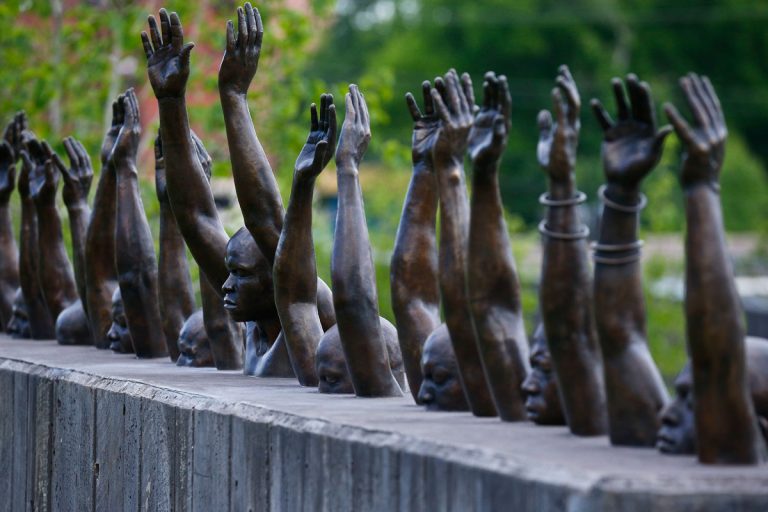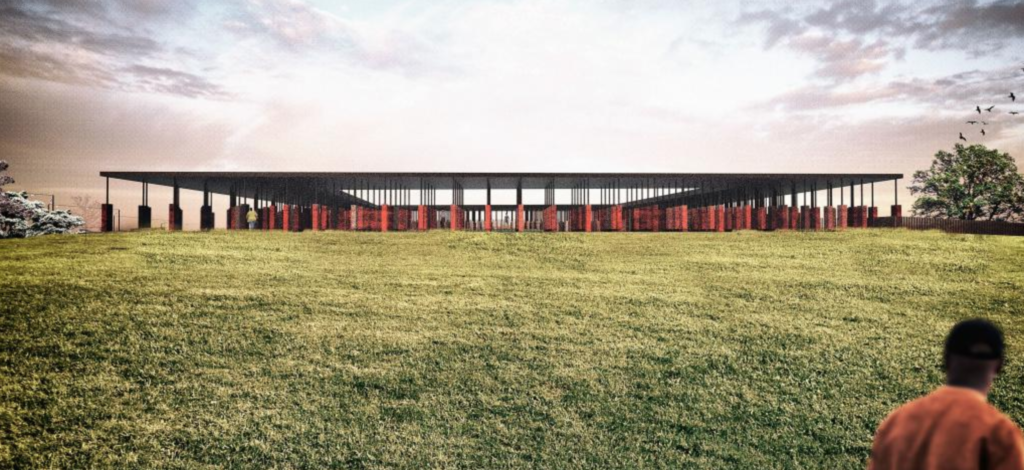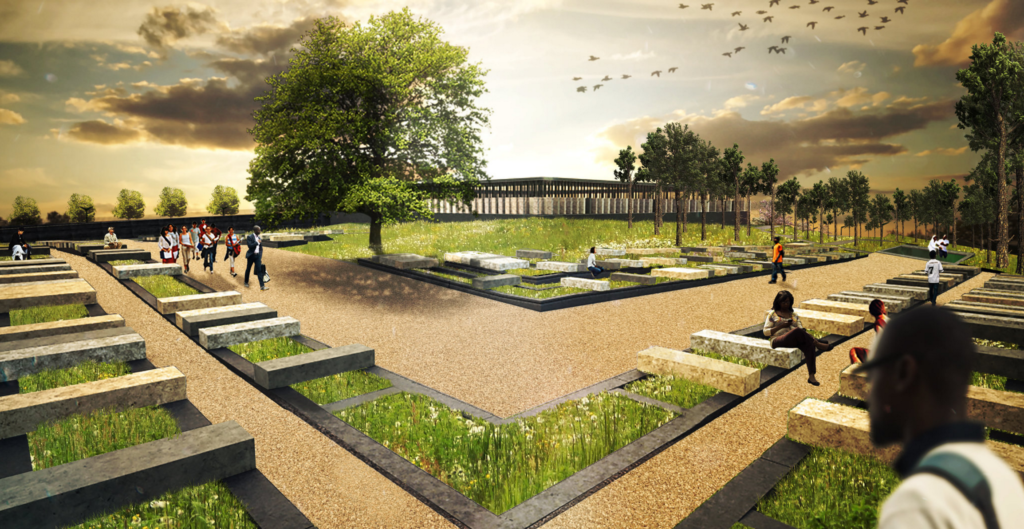National Memorial for Peace and Justice in Montgomery open to the public

The National Memorial for Peace and Justice, a six-acre site overlooking the Alabama State Capitol in Montgomery opened to the public on Thursday. Dedicated to 4,075 blacks that research by the Equal Justice Initiative (EJI) shows were killed by lynching in the U.S. from 1877 to 1950, the memorial features their names engraved on 800 steel rectangles, one for each U.S. county where lynchings occurred. The site will also feature a museum, From Enslavement to Mass Incarceration, that will be situated within 150 yards of one of the South’s most prominent slave auction sites and the Alabama River dock and rail station where tens of thousands of enslaved black people were trafficked. The museum will contain high-tech exhibits, artifacts, recordings, and films, as well as comprehensive data and information on lynching and racial segregation. It will also connect the history of racial inequality with contemporary issues of mass incarceration, excessive punishment, and police violence. An official opening ceremony for memorial will take place at the Montgomery Convention Center in downtown Montgomery Thursday evening. it will be accompanied by the two-day EJI Peace and Justice Summit at the Montgomery Performing Arts Center. Alabama 7th District U.S. Rep. Terri Sewell, who will be in attendance for the opening ceremony of the unveiling on Thursday, said the memorial “puts on display the unspeakable brutality and the human cost of lynching.” “The National Memorial for Peace and Justice puts on display the unspeakable brutality and the human cost of lynching and racial terror in America,” explained Sewell. “No matter how painful, these are memories which our nation must confront. We cannot appreciate how far we have come without acknowledging where we have been.” “It is especially powerful that this Memorial finds its home in Alabama, where more than 300 African Americans were killed by lynching and millions more were terrorized by white supremacy. In Montgomery, where dozens of markers still commemorate the confederacy, a remembrance of racial violence and its victims is long overdue. Along with the U.S. Civil Rights Trail, the Rosa Parks Museum, and other historic sites in Montgomery, the National Memorial for Peace and Justice uses the lessons learned from our past as a model for healing and sustainable economic growth that will give visitors from around the world a truer understanding of our history.”
Oprah, 60 Minutes airs photos of lynchings from new Alabama memorial; here’s why

Montgomery, Ala. The original capital of the Confederacy, a city once mired in racism, will soon redefine its legacy when it opens the nation’s first memorial dedicated to lynching victims and a new museum dedicated to slavery in the spring. The National Memorial for Peace and Justice in Alabama’s capital city on April 26, 2018. A project of the Equal Justice Initiative (EJI), the memorial is devoted to 4,075 blacks EJI’s research shows were killed by lynching in the U.S. from 1877 to 1950. It will serve to acknowledge an era of racial terror in the United States when thousands of African Americans were lynched and publicly tortured, sometimes in the presence of thousands of people. On Sunday night’s episode of 60 Minutes, Oprah Winfrey visited the memorial before it’s opening to give viewers a glimpse into’s America’s painful history. As part of the report, the episode showed photos of actual lynchings — a decision CBS said Oprah and a team of producers intentionally made knowing they would disturb many viewers. “I don’t think the story exists without those photos,” Jeff Fager, the executive producer of the broadcast told CBS. According to CBS, “News executives have a tendency to self-censor too much, he says, out of concern that viewers will be turned off. For him, the decision to show the photos was about reporting important facts about a little-known but important chapter of history.” The decision to air the footage partners perfectly to the reason the memorial was created in the first place: the hope of creating a sober, meaningful site where people can gather and reflect on America’s history of racial inequality. “Our story is about a part of history, really almost 80 years of American history, that isn’t in the history books, 60 Minutes Overtime’s Ann Silvio said of the broadcast. “We don’t see these pictures. We don’t talk about it.”
National lynching memorial and slavery museum sets open date in Alabama

The original capital of the Confederacy, a city once mired in racism, will soon redefine its legacy when it opens the nation’s first memorial dedicated to lynching victims and a new museum dedicated to slavery in the spring. The Equal Justice Initiative on Monday announced it will open the National Memorial for Peace and Justice in Montgomery, Ala. on April 26, 2018. The memorial, devoted to 4,075 blacks EJI’s research shows were killed by lynching in the U.S. from 1877 to 1950, will acknowledge an era of racial terror in the United States when thousands of African Americans were lynched and publicly tortured, sometimes in the presence of thousands of people. Designed with hundreds of six-foot, corten steel monuments aligned in a structure that sits above the city of Montgomery, EJI’s memorial will feature new sculptures from African and African American artists that explore slavery, segregation, and contemporary issues of racial inequality. The spacious park holding the memorial will include a monument for every county in America where a racial terror lynching took place that can be claimed by community groups and installed locally. “Our nation’s history of racial injustice casts a shadow across the American landscape,” Bryan Stevenson, director of EJI, said in a statement. “This shadow cannot be lifted until we shine the light of truth on the destructive violence that shaped our nation, traumatized people of color, and compromised our commitment to the rule of law and to equal justice.” The six-acre site will also feature a museum, From Enslavement to Mass Incarceration, a few blocks away from the memorial that will be situated within 150 yards of one of the South’s most prominent slave auction sites, near the Alabama River dock and rail station where tens of thousands of enslaved black people were trafficked. Check out a preview of the memorial below: Tickets for admission to the museum and the memorial are now available at museumandmemorial.eji.org.
Lynching memorial to open in Montgomery

Southern states have long welcomed tourists retracing the footsteps of the late Martin Luther King Jr. and others who opposed segregation. Now the Alabama city that was the first capital of the Confederacy is set to become home to a privately funded museum and monument that could make some visitors wince: a memorial to black lynching victims. The nonprofit Equal Justice Initiative has announced it is building a memorial in the state capital of Montgomery devoted to 4,075 blacks its research shows were killed by lynching in the U.S. from 1877 to 1950. The nonprofit’s director, Bryan Stevenson, said the aim is to help “change the landscape” of American racial discourse by openly acknowledging a painful past, much as Germany has Holocaust memorials and South Africa a museum on its past state-sanctioned segregation — apartheid. He said that while hundreds of whites were lynched in roughly the same period of U.S. history, the memorial’s focus will be on “terror lynchings” against blacks in a dozen Southern states — whether by hanging, gunshots, beatings, burnings or other forms of killing used in the past to terrorize black communities. “I don’t think we can afford to continue pretending that there aren’t these really troubling chapters in our history,” Stevenson said. “I think we’ve got to deal with it.” Set to open next year on the site of a former low-cost housing project, the monument is to be accompanied by a museum a few blocks away exploring the history of blacks in America from slavery to the present. Work is already under way on both. How they will be received is an open question. Pausing at a historical plaque while visiting Montgomery’s civil rights sites, North Carolina tourist Nancy Lange hesitated at the thought of a lynching memorial. “That is tough. I can’t even think beyond that word,” said Lange, 58, who’s white. But daughter Teresa Lange, 27, said a memorial could be valuable in teaching about America’s racial past and fostering conversation about today’s climate of Black Lives Matter, police violence against minorities and racial strife. “How many people talk about lynching? How many people talk about the hate crimes that still go on today?” she said. “As a tourist I think it would be a good thing. … I’d go see it.” Equal Justice Initiative said the monument and museum also would help counter glorification, in some quarters, of the Confederacy across the South while telling the painful story of race in America. The law firm and its founder, Stevenson, represent death row inmates and advocates for racial justice. The group already has erected bronze plaques around Montgomery to denote bygone slave markets; another group has built a memorial honoring civil rights martyrs, mostly African-Americans. Elsewhere in Montgomery, a marker explains the history of the church parsonage bombed while King lived there in 1956. The monument set for a hill in view of Alabama’s Capitol — where the Confederacy was formed — is to include thousands of names of lynching victims etched on hundreds of concrete columns. Each column represents a U.S. county where a lynching occurred. The names were gathered both in past research and new work by Equal Justice Initiative. The nearby museum is to house what organizers describe as the nation’s largest collection of information on lynching. Located in the nonprofit’s headquarters, it also will include presentations about the domestic slave trade, racial segregation and the incarceration of large numbers of blacks today. Stevenson said the final design of both the memorial and museum will depend on fundraising, though the Ford Foundation already has given $2 million. Alabama tourism director Lee Sentell said the project has the potential to be important. But he said his agency will need to find out more about the new project before deciding whether to promote it alongside civil rights attractions such as the Birmingham Civil Rights Institute or the Edmund Pettus Bridge in Selma, where marchers for voting rights were beaten by state police in 1965. “It is a difficult subject for most all of us Southerners to contemplate because people who are alive today have never had to give this subject much thought,” Sentell said. He added of the memorial that “the execution of the details will either make people glad they visited the location or not.” He said Alabama began promoting civil rights sites for tourism in the 1980s. A “Black Heritage Guide” published then was updated and later morphed into the “Alabama Civil Rights Trail,” a guide of museums and historic sites. Not everyone is on board with a lynching memorial. Marlin Taylor, an African-American visitor from Spokane, Washington, was surprised by it. “With the climate in America right now I don’t know that that’s a good idea,” Taylor said at the civil rights memorial outside the Southern Poverty Law Center, a public interest law firm. “I feel like that could be more divisive than anything.” But the Alabama commander of the Sons of Confederate Veterans, Jimmy Hill, supports it. He said telling the story of the lynchings will help people understand America’s tangled, painful past. “Yes, it’s going to hurt some people. There are some people who are going to see that and say they wish the story wouldn’t be told. But we are on the opposite side of that. We just want the whole story to be told,” Hill said. Republished with permission of the Associated Press.
Equal Justice Initiative plans memorial to lynching victims in Alabama

The Equal Justice Initiative has announced plans to open a national memorial to lynching victims next year in Montgomery, Ala. The Montgomery-based organization released a stunning report in 2015, Lynching in America: Confronting the Legacy of Racial Terror, that documents more than 4,000 lynchings of African Americans in the United States between 1877 and 1950. The memorial will honor each victim by engraving their name on floating concrete columns representing over 800 counties in the United States where racial terror lynchings took place. Counties across the country will be invited to retrieve duplicate columns with the names of each county’s lynching victims to be placed in every county. The six-acre site will also feature a museum, From Enslavement to Mass Incarceration, that will be situated within 150 yards of one of the South’s most prominent slave auction sites and the Alabama River dock and rail station where tens of thousands of enslaved black people were trafficked. The museum will contain high-tech exhibits, artifacts, recordings, and films, as well as comprehensive data and information on lynching and racial segregation. It will also connect the history of racial inequality with contemporary issues of mass incarceration, excessive punishment, and police violence. Check out a video from EJI with more details on the memorial:


